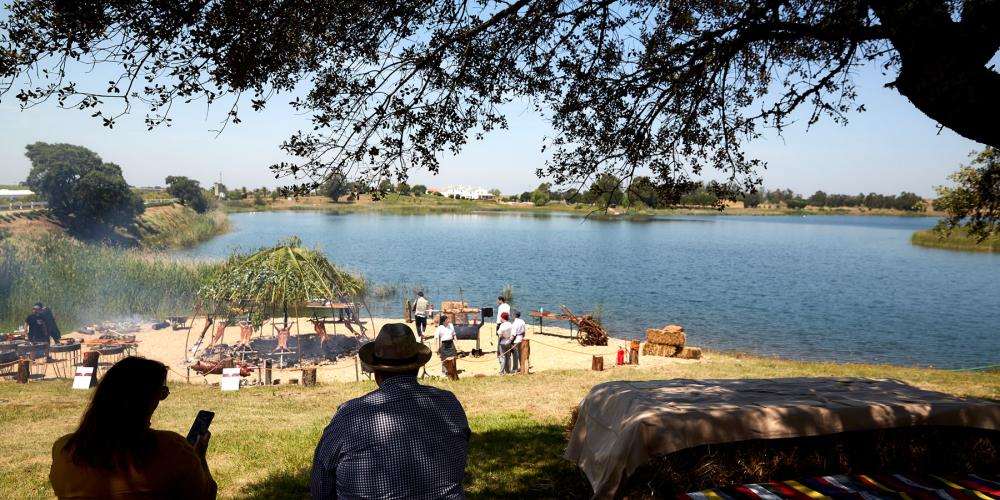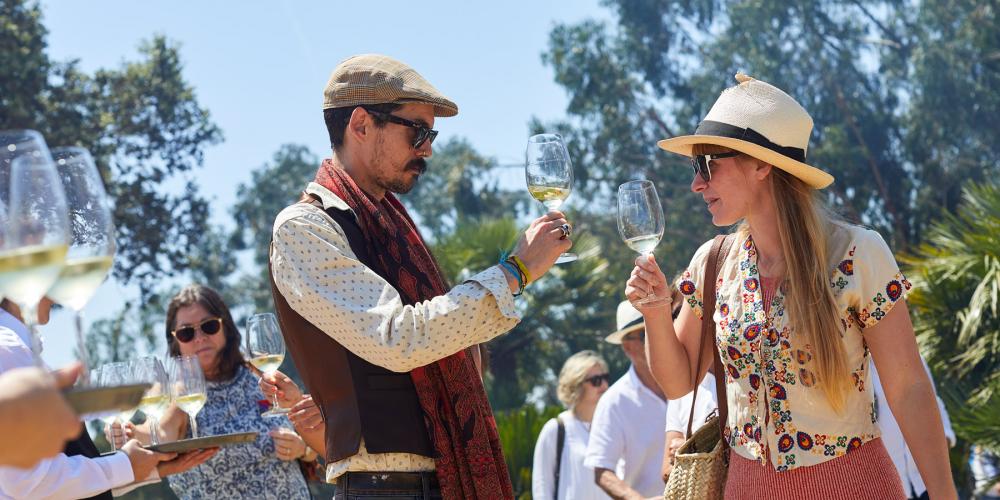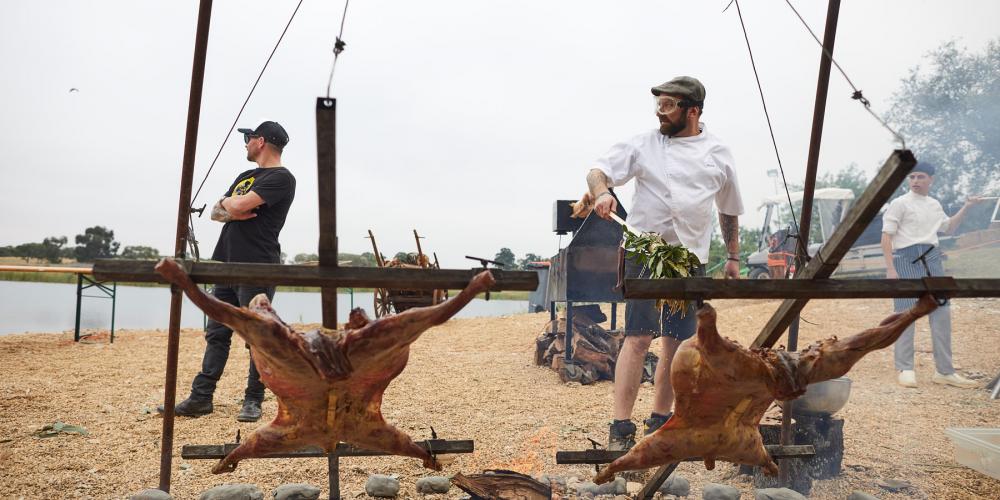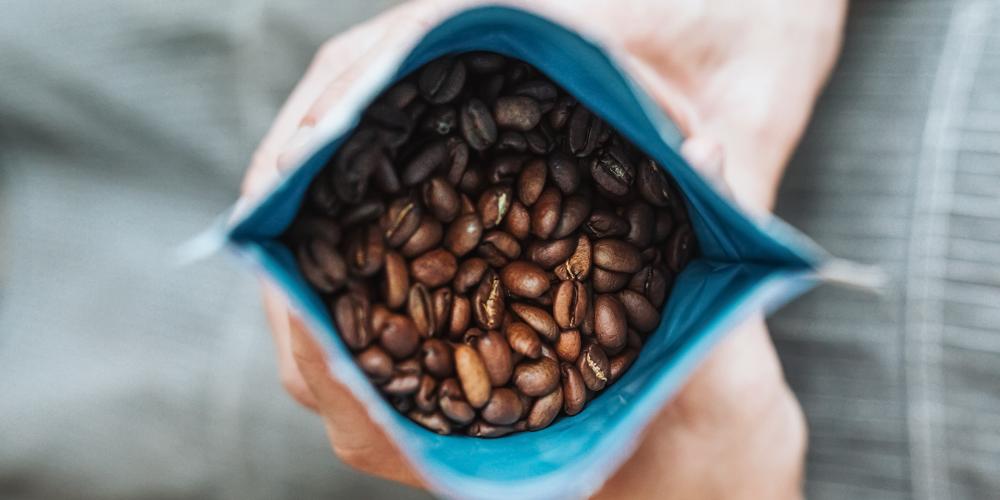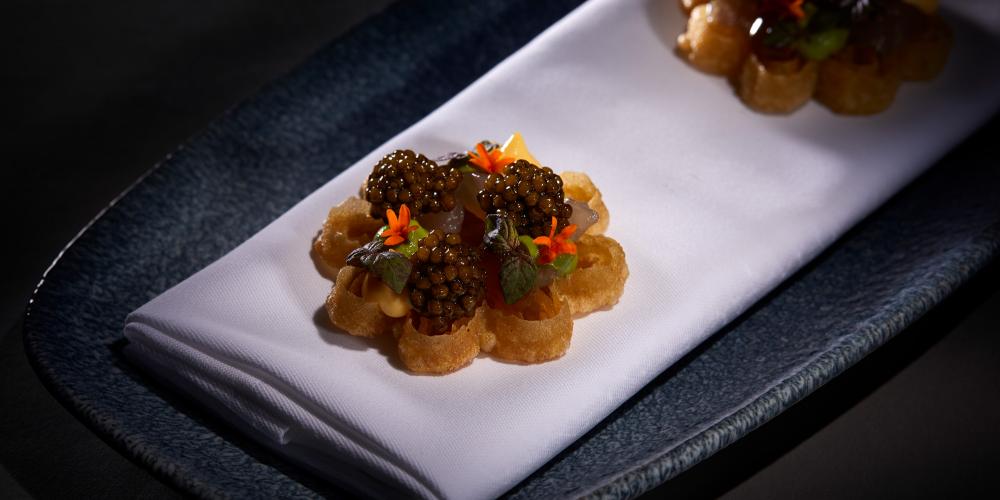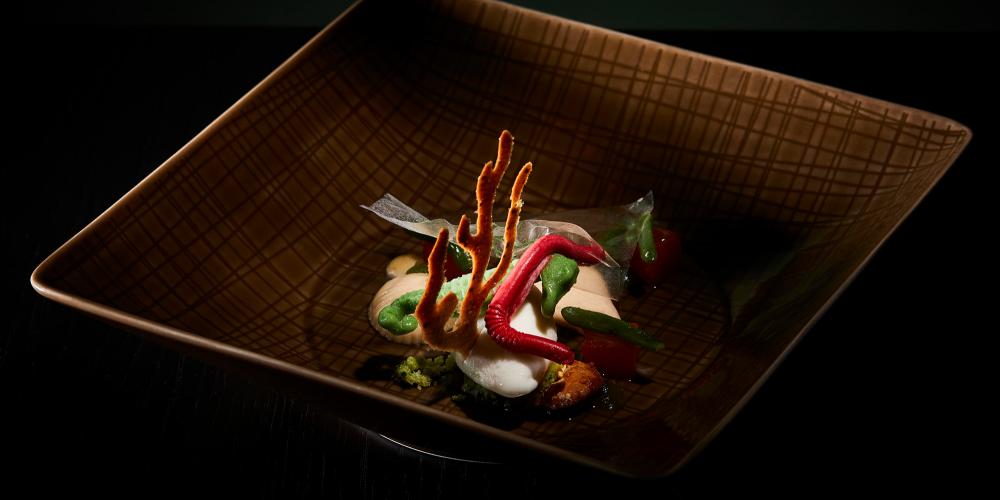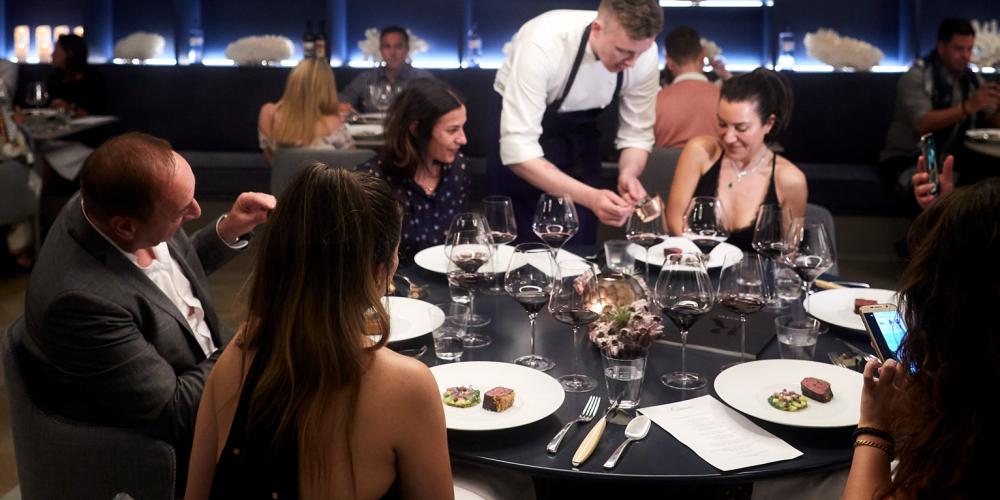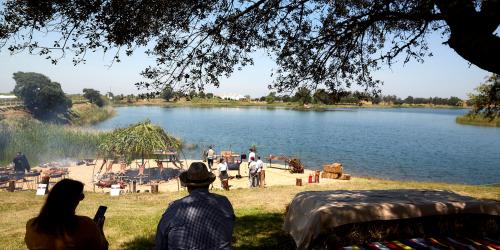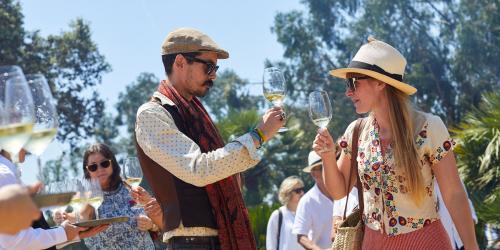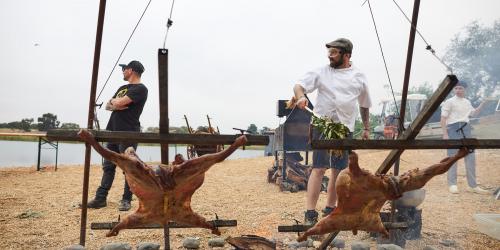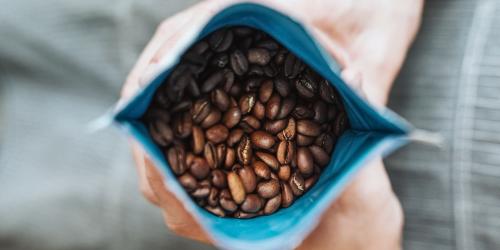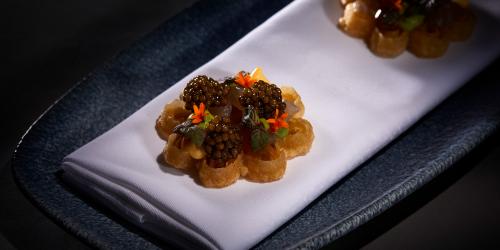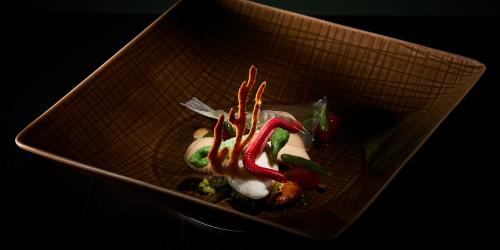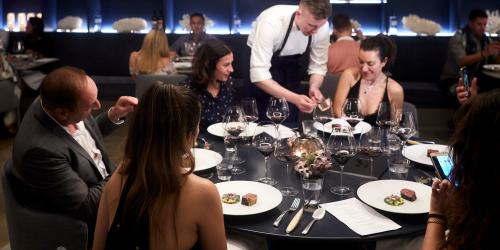Snapshots
4 November 2019 —  8 min.
8 min.
The nine days of the Fine Wines & Food Fair were marked by very special moments which showcased the spirit of a party for gourmet lovers and foodies. Here are a few snapshots, not all perceptible to the guests, which will stay with us forever.
Where there is smoke, there is a fire!
Smoke signs. A camp site. The preparations begin the day before. At 11:40 p.m., a pork weighing 120 kilos is put on the spit to roast on a low heat. At dawn, ten lambs, four piglets and ten free-range chickens are placed over the coals. The sausages, and the vegetables, organically grown on the Herdade dos Grous vineyard and farm estate in the Alentejo, arrive closer to lunchtime. Two chefs, Ljubomir Stanisic and Hans Neuner (Ocean**), attend to the fire by the lake, whilst resident chef Rui Prado (Herdade dos Grous) and executive chefs Paulo Fortes and Manfred Kickmaier (VILA VITA Parc), complemented by the teams from the resort and the farm, prepare the feast. More than two tons of firewood oak feed the fire that reaches 300ºC, and its embers nourish the other fires around. Inside the fire pit, it’s 180ºC, a giant grilling structure designed by the Bosnian celebrity chef, whom the Portuguese have become accustomed to see on television, revealing the nightmare that a restaurant´s kitchen can turn out to be. The meat is seasoned from time to time. The guests begin to arrive and the party begins.
Uncle Micha taught him the art of fire, how to kill a pig, to fish, to smoke, close to the Bosnian border. And today, man's primal instinct with fire has become a fashion. The chefs taste the meat, even drink it, and have fun. One can’t help notice their passion, despite the burns on their hands - marks of war of those who cook with fire. The music that accompanies the barbecue begins to play, songs from the Alentejo that echo in the plain, and with the guests. For many, it is the most authentic experience they will take from Portugal.
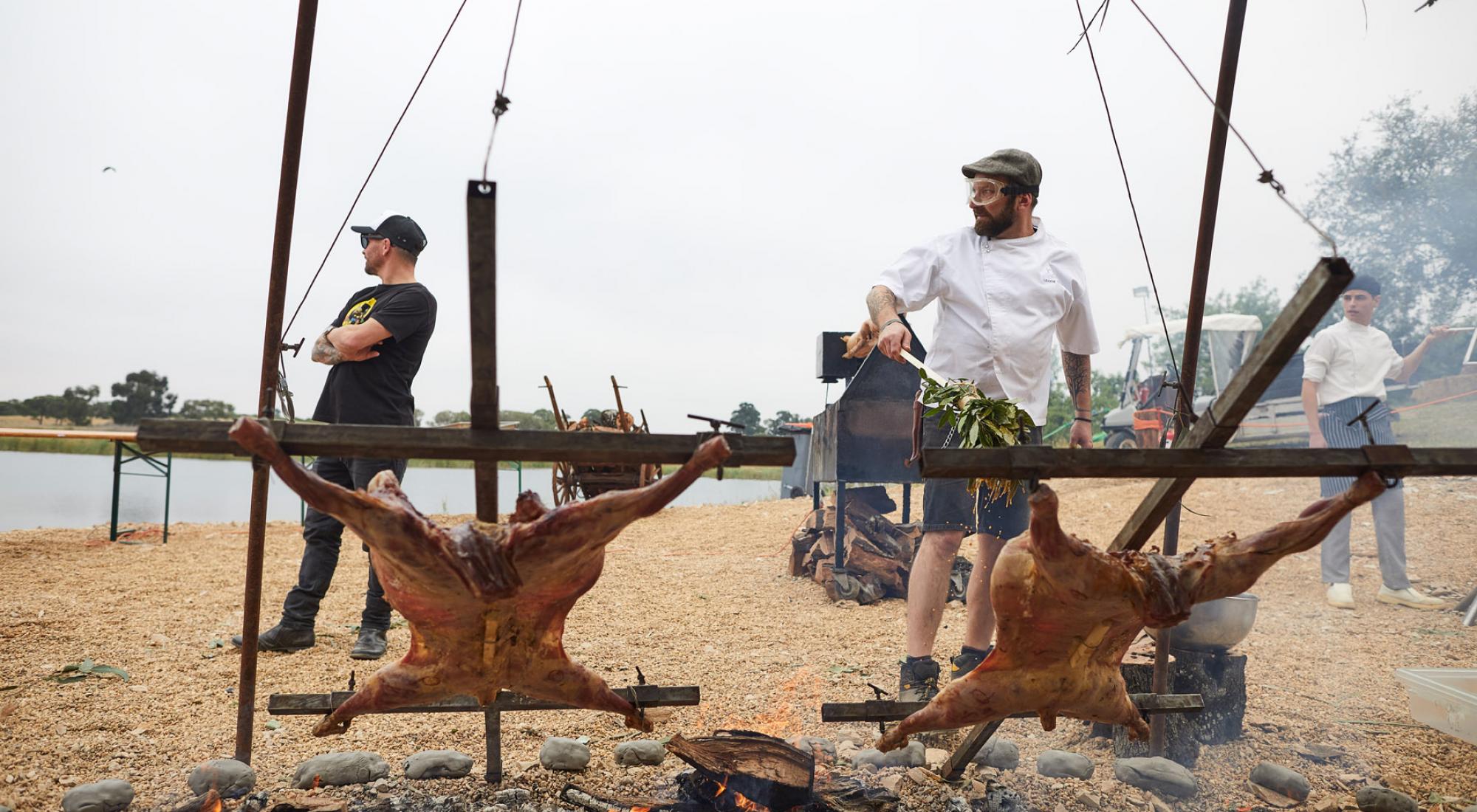
If it’s coffee, let it be the best in the world!
He only drank tea. He never liked coffee, until the day his wife told him she was buying an expresso machine. He agreed, to please her. Born in Israel, into a family dedicated to tobacco for six generations, Amir Gehl left at the age of 11 to live in Germany and has always cultivated the sensory world: good food, great wines, the best cigarettes. Why not explore coffee, the second most consumed beverage in the world after water? As with everything, he wanted to know which was the best coffee. The truth of the matter was, that most of the time, the coffee he drank away from home not as good as the one of his machine. He didn’t know anything about it, but he wanted to pair the uncomplicatedness of the machine together with the best beans, and noticed that there was a gap in the market. He hired Johnny England, one of the most prestigious roasters in the world, and sought out the best beans, snatching the top-end lots. This strategy marked a position in the market and, within five years The Difference Coffee Company became a reference when it comes to the best coffee.
It is Amir himself who tells the story, arousing the curiosity of a sleepy audience, in the coffee masterclass at VILA VITA Parc. He talks about the most common species: Robusta, fuller-bodied and intense; and Arabica, more aromatic and fragrant and with less caffeine. A map of specialty coffee consumers is drawn, with Australia leading the way. There is talk of the importance of the water used in the coffee (the Norwegian Voss and the Portuguese Penacova are perfect due to the low mineral content, not altering the flavour of the coffee) and milk as accompaniment. Without going into too much detail, it goes well with a Blue Mountain from Jamaica, he admits, but it would be a crime to mix with a Geisha. This was what everyone had come for: to taste one of the most expensive coffees in the world.
Amir Gehl prepares the filter coffee with great care for everyone to taste. By this time, there is a heightened curiosity. We had already tasted a normal bean and a Geisha and noted the difference in aromas, when he serves the famous Panama coffee, which originates from a small plantation in Ethiopia. The colour is coppery, clean, with such a rich bouquet that it’s almost like an earl grey tea in perfume and flavour. It is the highest-scoring coffee in all specialty coffee competitions (94.66 points out of 100), and only a modest 45 kilos are auctioned per year, which raises its value to almost € 800 a kilo. In the few places in the world where it is available, a cup of Geisha costs around € 15 but there are those who charge € 30...
A star-studded gem that wanders through some of the resort’s kitchens these days to shine at the Fine Wines & Food Fair.
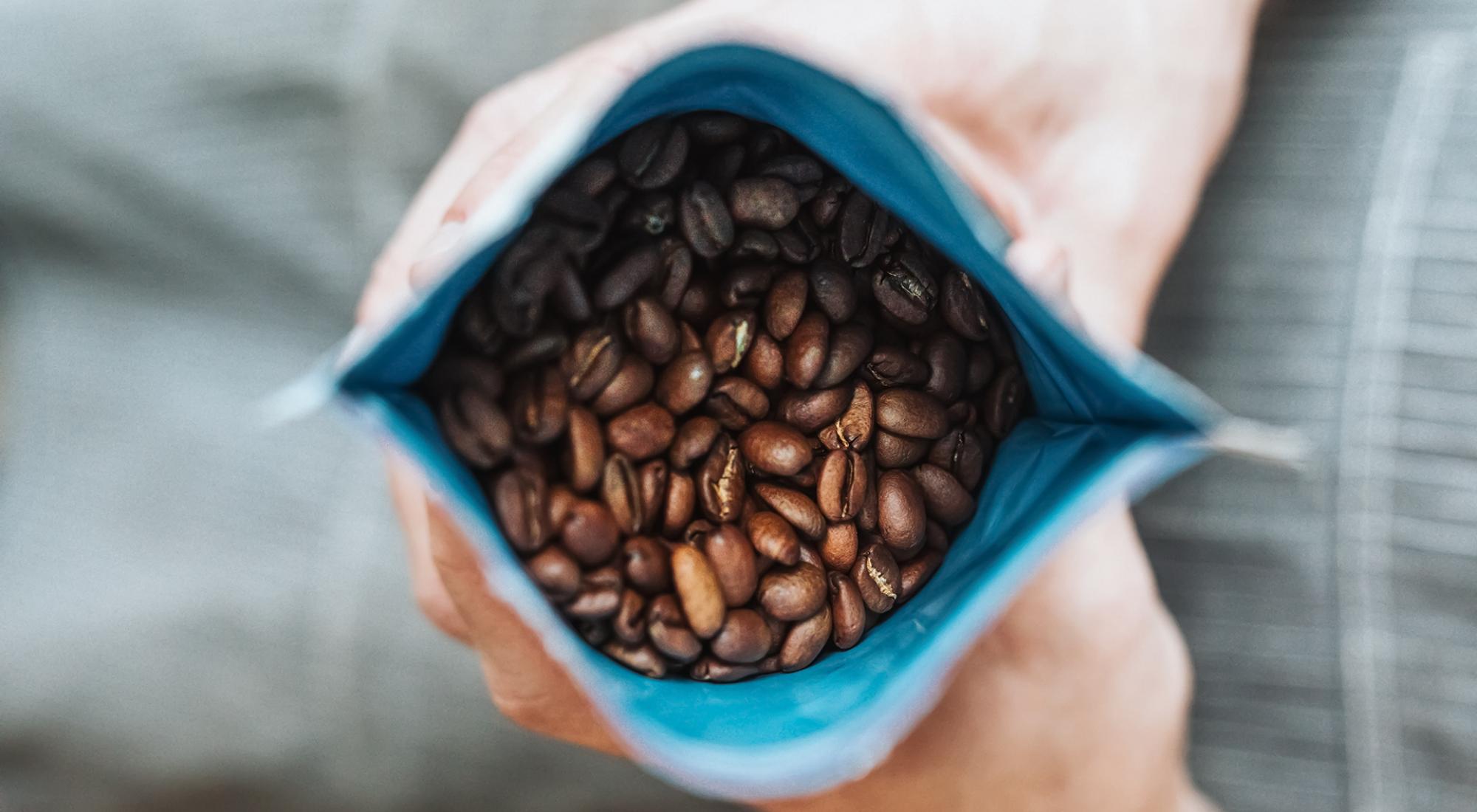
Silence, it’s time to cook!
You could hear laughter, some odd phrases in German and English, the service orders – but basically lots of messing around! On the All-Stars night the movement in the Atlantico kitchen was greater than usual, up until Christian Bau entered the scene and, schhhh... The chef requested total silence in the kitchen. There was something sacred about that moment, a heightened respect for the food, for the German chef, and for the creative dishes by chef Christian Bau.
Crafted with his hands, out comes the starter, a Japanese waffle with mackerel, caviar and seagrass crème, followed by the main dish: turbot, Hawaiian palm heart, yuzu-koshu, xo-oil, all Japanese influenced, which so represents his style. Leaning over the counter, he plates the ingredients with rigour. The sound of a pin drop could be heard. Total silence! Once the service is over, the festive spirit of the Fine Wines & Food Fair is back!
As the three Michelin star chef of Victor’s Fine Dining restaurant by Christian Bau, later explained, he cannot have any stress around him when he works, it has to be calm and quiet, so that his cooking can reveal the passion he puts in everything he does. It is this passion that moves him, his mantra tattooed on his right arm: “Do it with passion or don’t do it at all”. But don’t be mistaken, his restaurant is no Buddhist retreat - the room right beside his kitchen plays good and loud electronic music all night.
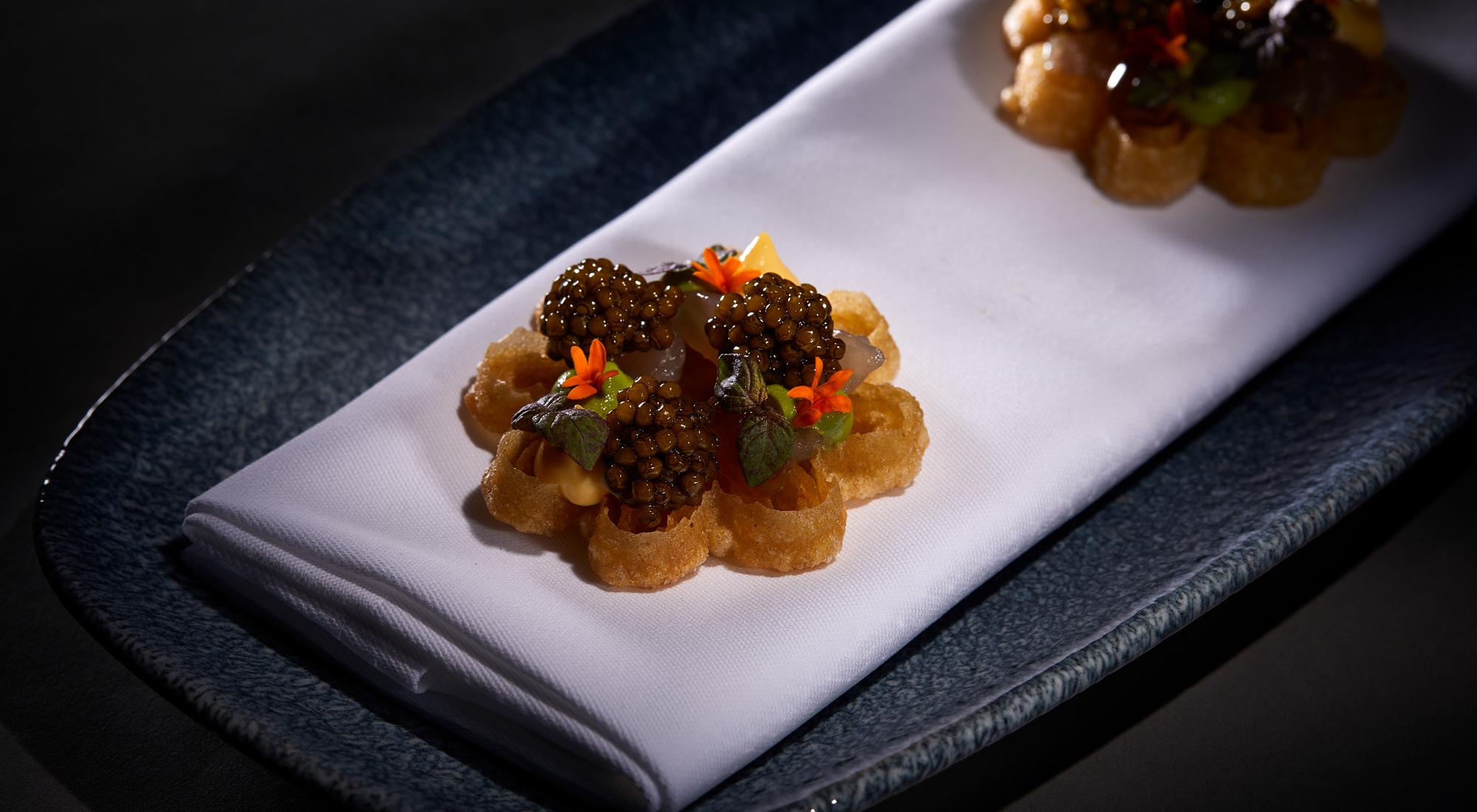
A “no plastic” manifesto. Stop!
The image of a seahorse carrying a cotton bud seen in a documentary made Hans Neuner reflect and challenge his team to dwell on this. One day on a walk on the beach, Márcio Baltazar - born in Lourinhã, a land up north where dinosaur fossils can be found -, idealised a manifesto in the form of a dessert, and put his hands to it on the All-Stars Night. Ocean’s head pastry chef recreated the habitat of Ria Formosa’s most emblematic creature - which extends over more than 60 km along the Algarvian coast - with shells, seaweed, a seahorse and plastic…
The almost childlike sweet is a cry for attention regarding plastic waste and the way it threatens the marine resources by propelling the species to a sort of Jurassic Park. The seahorse community in Ria Formosa, which, at one point not so long ago, had been one of the largest in the world, has been rapidly dwindling due to human intrusion, illegal fishing and the excessive use of motorized boats. Amongst a menu rich in fish and seafood, concocted by Dieter Koschina (Vila Joya), Jacob Jan Boerma (De Leest), Christian Bau (Victor’s Fine Dining by Christian Bau) and Ocean’s chef, Hans Neuner, the star dish was a portrait of what can be seen at the bottom of the ocean. Stop! We must act now! There is no Planet B!
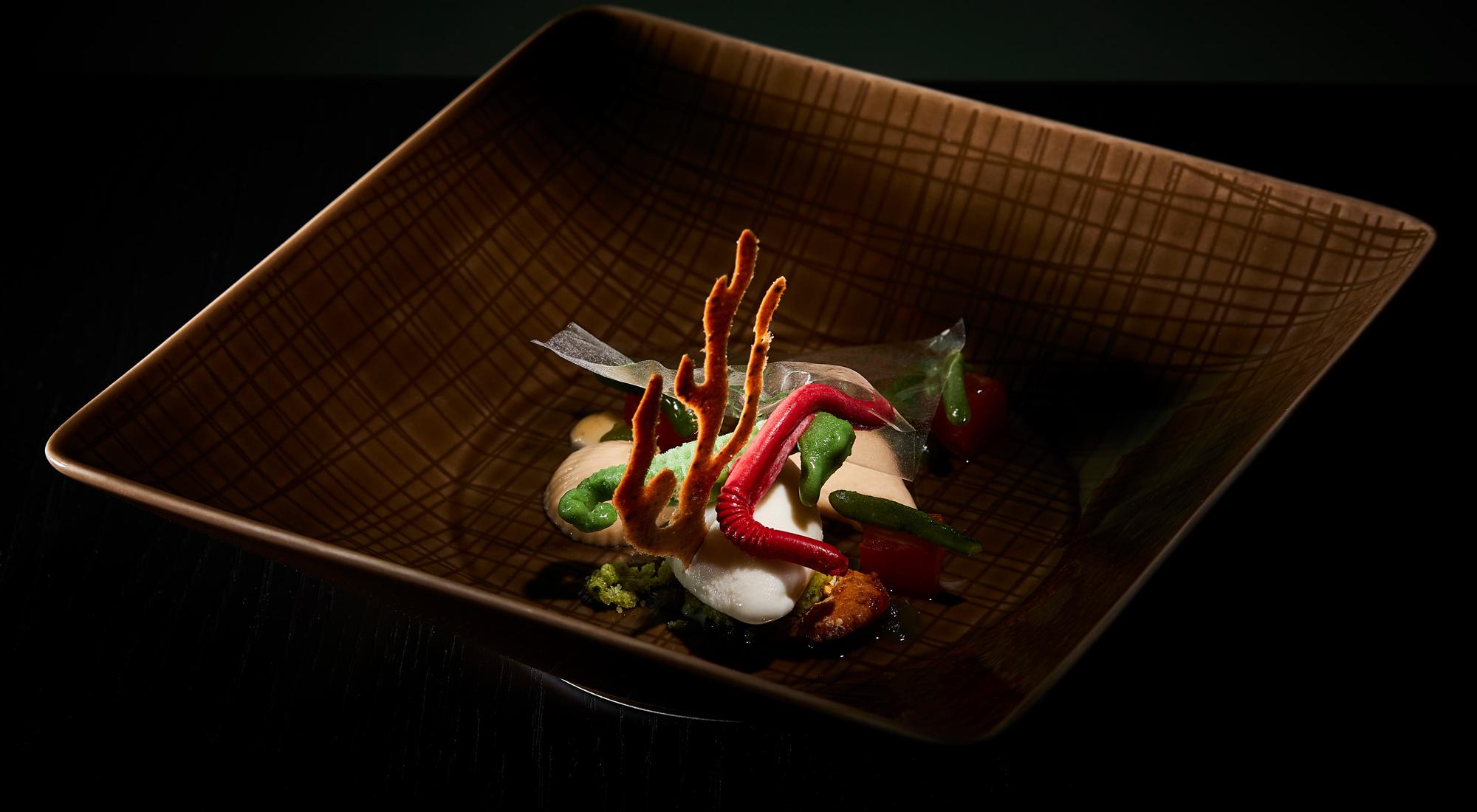
Eggs - only with Thomas Allan’s signature!
There is a “before” and an “after” tasting the “Eggs on Eggs on Eggs”, one of the signature dishes at The Modern, in New York, where there is a waiting list of a month for a table. Thomas Allan is a chef prodigy – in 2014, one day before his 26th birthday, he became chef at Abram Bissell’s two Michelin star restaurant, at the MoMA –, but at 31, he continues to amaze and carve a niche among the best. For the four-hands dinner with Hans Neuner, he presented his signature dish, made up of an egg cooked at low temperature, Imperial caviar, a toasted brioche and dill. If there are combinations that can be an alchemy of tastes bordering perfection, this could well be one of them. Simple
ingredients, a harmonious mixture of textures, all elegantly presented. The appreciation in the dining room was unanimous. The problem arose the next day at breakfast: how would you like your eggs, sir? Thomas Allan’s “Eggs on Eggs on Eggs” style, please!... And never again will an egg be the same.
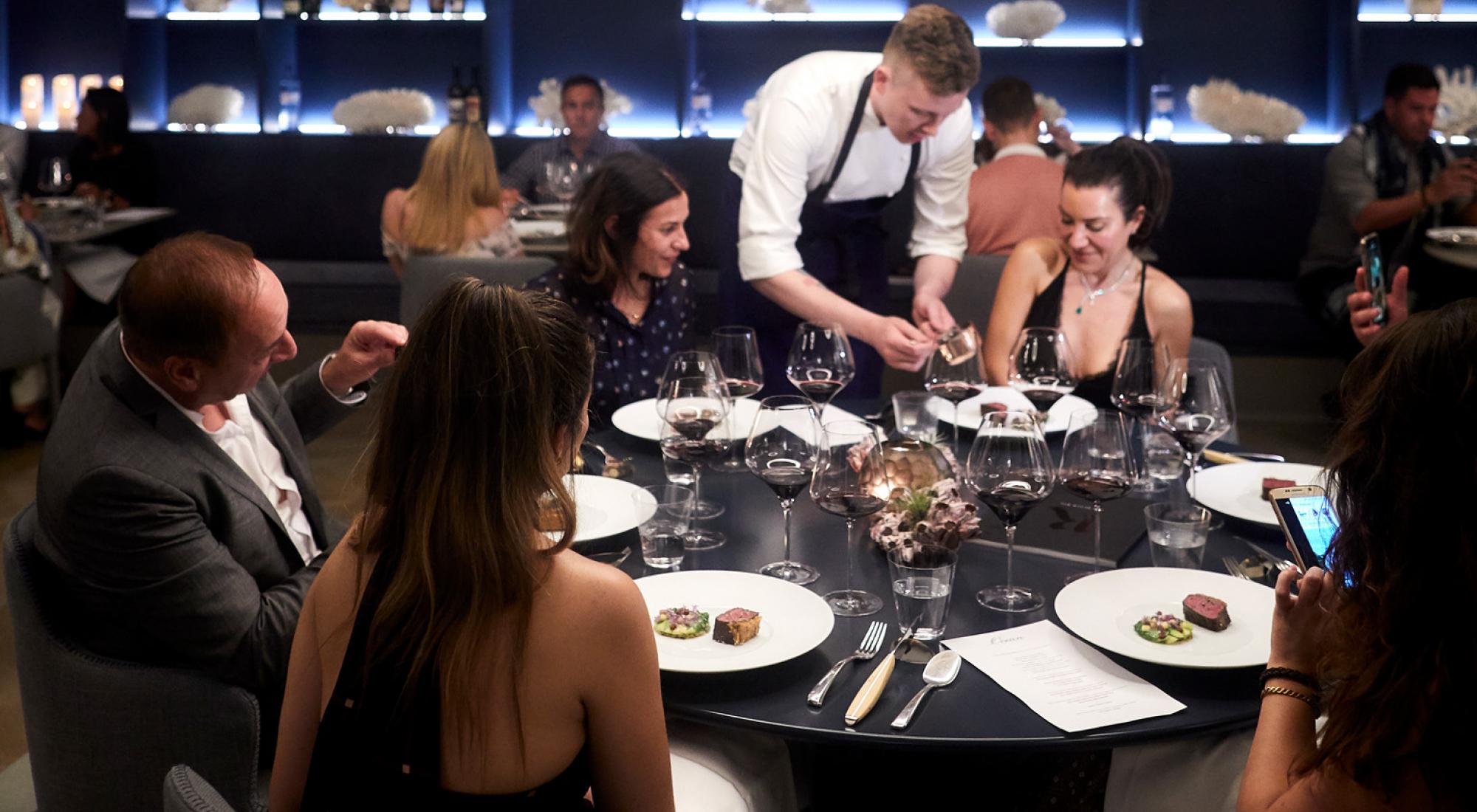
4 November 2019
28 October 2019
13 May 2019
12 May 2019
11 May 2019
10 May 2019
9 May 2019
8 May 2019
5 May 2019
